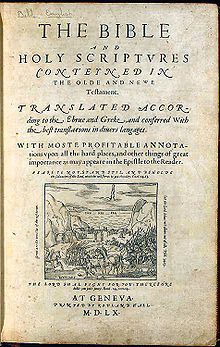
Back كتاب جنيف المقدس Arabic Bíblia de Ginebra Catalan Geneva-Bibel German Biblia de Ginebra Spanish Geneven Raamattu Finnish Geneva Bible French תנ"ך ז'נבה HE Alkitab Jenewa ID Bibbia di Ginevra Italian ジュネーヴ聖書 Japanese
| Geneva Bible | |
|---|---|
 Geneva Bible 1560 edition | |
| Full name | Geneva Bible |
| Other names | Breeches Bible |
| NT published | 1557 |
| Complete Bible published | 1560 |
| Derived from | Tyndale Bible |
| Textual basis | Textus Receptus (New Testament) Masoretic Text and influence from Tyndale and Coverdale (Old Testament) |
| Publisher | Sir Rowland Hill of Soulton |
| Religious affiliation | Protestant (Reformed) |
In the beginning God created the heaven and the earth. And the earth was without forme and voyde, and darkeness was upon the depe, and the Spirit of God moved upon the waters. Then God said, "Let there be light" and there was light.
For God so loved the world, that he hath given his only be gotten Son, that whosoever beleveth in him, should not perish, but have everlasting life. | |
The Geneva Bible is one of the most historically significant translations of the Bible into English, preceding the Douay Rheims Bible by 22 years, and the King James Version by 51 years.[1] It was the primary Bible of 16th-century English Protestantism and was used by William Shakespeare,[2] Oliver Cromwell, John Knox, John Donne and others. It was one of the Bibles taken to America on the Mayflower (Pilgrim Hall Museum has collected several Bibles of Mayflower passengers), and its frontispiece inspired Benjamin Franklin's design for the first Great Seal of the United States.[3]
The Geneva Bible was used by many English Dissenters, and it was still respected by Oliver Cromwell's soldiers at the time of the English Civil War, in the booklet The Souldiers Pocket Bible.[4]
Because the language of the Geneva Bible was more forceful and vigorous, most readers strongly preferred this version to the Great Bible. In the words of Cleland Boyd McAfee, "it drove the Great Bible off the field by sheer power of excellence".[5]
- ^ Metzger, Bruce (1 October 1960). "The Geneva Bible of 1560". Theology Today. 17 (3): 339–352. doi:10.1177/004057366001700308. S2CID 170946047.
- ^ Ackroyd, Peter (2006). Shakespeare: The Biography (First Anchor Books ed.). Anchor Books. p. 54. ISBN 978-1400075980.
- ^ "The Bible in American History: Creating a Great Seal for the New Nation". academic.oup.com. Retrieved 16 December 2023.
- ^ Metzger, Bruce (1 October 1960). "The Geneva Bible of 1560". Theology Today. 17 (3): 351. doi:10.1177/004057366001700308. S2CID 170946047.
- ^ McAfee, Cleland Boyd, Study of the King James Bible, Project Gutenberg.